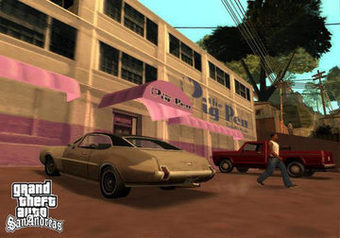The First Amendment protects the makers of the Grand Theft Auto: San Andreas video game against claims of trademark infringement, the Ninth Circuit found Nov. 5.
In E.S.S. Entertainment 2000, Inc. v. Rock Star Videos, Inc., the owner of the Play Pen strip club sued the video game maker that allegedly depicted the club and its trademark in its fictional version of Los Angeles called “Los Santos.” In the game version, the club is called the “Pig Pen” (depicted below).

The artists who developed the game took inspiration from photographs of the Play Pen but used photos of other East Los Angeles locations to design other aspects of the fictional “Pig Pen.”
In 2005, E.S.S. filed suit in the Central District of California for state and federal trade dress infringement and unfair competition. The heart of its complaint was that Rock Star used its logo and trade dress without authorization and created a likelihood of confusion among consumers as to whether E.S.S. endorsed or is associated with the game.
Rock Star moved for summary judgment, arguing in pertinent part that regardless of whether it infringed E.S.S.’ trademark rights, the First Amendment protects it against liability.
The district court granted the motion (in a 55-page opinion), and E.S.S. appealed.
Applying the “Barbie Girl” case of Mattel, Inc. v. MCA Records, Inc., 296 F.3d 894 (9th Cir. 2002), which protected MCA’s right to publish a song with Mattel’s BARBIE trademark in its title, the Ninth Circuit affirmed.
The court noted that “ESS argues both that the incorporation of the Pig Pen into the Game has no artistic relevance and that it is explicitly misleading. It rests its argument on two observations: (1) the Game is not ‘about’ ESS’s Play Pen club the way that ‘Barbie Girl’ was ‘about’ the Barbie doll in MCA Records; and (2) also unlike the Barbie case, where the trademark and trade dress at issue was a cultural icon (Barbie), the Play Pen is not a cultural icon.”
The court acknowledged these factual differences but found they missed the point. “Under MCA Records and the cases that followed it, only the use of a trademark with ‘no artistic relevance to the underlying work whatsoever’ does not merit First Amendment protection. In other words, the level of relevance merely must be above zero. It is true that the Game is not ‘about’ the Play Pen the way that Barbie Girl was about Barbie. But, given the low threshold the Game must surmount, that fact is hardly dispositive. It is also true that Play Pen has little cultural significance, but the same could be said about most of the individual establishments in East Los Angeles. Like most urban neighborhoods, its distinctiveness lies in its ‘look and feel,’ not in particular destinations as in a downtown or tourist district. And that neighborhood, with all that characterizes it, is relevant to Rockstar’s artistic goal, which is to develop a cartoon-style parody of East Lost Angeles. Possibly the only way, and certainly a reasonable way, to do that is to recreate a critical mass of businesses and buildings that constitute it. In this context, we conclude that to include a strip club that is similar in look and feel to the Play Pen does indeed have at least ‘some artistic relevance.’”
Commentary on the appeal from Eric Goldman here, and on the underlying district court decision from the Gamasutra here.
The case cite is E.S.S. Entertainment 2000, Inc. v. Rock Star Videos, Inc., __ F.3d __, 2008 WL 4791705, No. 06-56237 (9th Cir. Nov. 5, 2008).